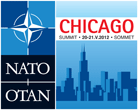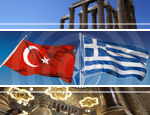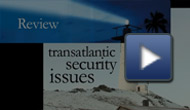Afghanistan: and after 2014?
Afghanistan faces a key year in 2014.
The drawdown of international troops
will be in its final stages.
The country will
elect a new president.
And Afghanistan's fragile democracy
will take its first unaided steps.
We ask Afghan experts how they see
the crucial year panning out.
We look at elections.
Can they be truly free and fair?
We ask about the peace process
and what the Taliban's role will be.
How do women see
2014 in Afghanistan?
Is it a year to consolidate gains made
or to worry about losing them?
How will Afghanistan fare in
its perennial battle against corruption
and will this battle
be crucial to the country's future?
In 2002,
when we were conducting elections
for the emergency
Loyal Jirga commission,
there was a requirement
for the Jirga to have one female,
at least one female delegate
who met the criteria
of reading and writing and to be able
to participate in the Jirga.
And in the whole of Uruzgan we could
not find one with those criteria.
And we were literally
having a UN chopper
flying from one district to another.
We were told that in Deh Rahod
there is a midwife worker in a clinic,
that she may meet the criteria.
We literally flew there,
we talked to her, we put her
on a chopper with a family member,
and we flew her back
to Tarin Kowt and then to Kabul.
Last year I went to Uruzgan
and the Governor called
the elders and everybody else
in the Governors Hall
and then there was
a group of females coming in.
The first row was filled
by the male participants,
so they insisted that part
of that first row was evacuated...
left empty for them, so for them
to be seated in the front row.
I said: Wow, that's great. And then
they spoke in front of these elders.
The culture of democracy, do you feel
that that has been engrained
in the mindset of Afghans now?
Look at the 2009 and 2010 elections.
The Taliban was posting threats.
They were killing polling workers,
they said that anybody
who participated in the elections
would be a target and would
be killed. But despite all that risk,
people knowing
that they were going to get killed
if they were found by the Taliban,
they went,
they stood in the queues and voted.
That is a strong message
that they are
for a democratic path to continue
and so they risked their lives
to stay on those queues.
Democracy is
not only about elections.
People are so much longing
for justice, for good governance.
These are essential parts
of democratic states.
Freedom of expression.
You look in Afghanistan and people
speak to the face of the president.
The media speaks openly,
criticizing the president
and government officials.
These are what they cherish
of a democratic environment
and therefore,
they want to see that continue.
Yes, there are setbacks,
there are some disappointments,
the fraudulent votes and the election
that had troubles and irregularities,
but those could be dealt with.
Could you explain how you feel
that the Taliban will be involved
in the peace process,
both leading up to 2014 and beyond?
The Taliban cannot be
a destiny for Afghanistan people.
Yes, they can be
involved in government,
but under Afghanistan constitution
and under the achievements
during these ten years
that Afghanistan people have done.
And in terms of post 2014,
assuming that some
peace process can succeed,
what's most important
in keeping the peace?
Is it the economy,
is it fighting corruption, is it security?
Which elements
do you feel are most important?
The engagement of Afghanistan
people in all policymaking,
especially social and civil society
and ordinary people of Afghanistan
to be engaged
in the policymaking process.
Rule of law is the most important part
that Afghanistan people need
and implementation of justice
can guarantee peace
and stability in Afghanistan.
So you don't feel
that the economic side will be
as important as the rule of law?
You know,
all these things are like a chain,
but if you have rule of law,
so the capital can be safe
and we can be sure that if people
spend their money in Afghanistan,
and they have money, they will be
willing to bring their money
and to do their businesses.
But without nobody will be willing
to bring their money to Afghanistan.
This is the big problem
of Afghanistan, that if you...
We don't have rule of law in for the
moment, or at least it is very weak.
But, if we improve this part,
so the other part can be,
under this part, can be guaranteed.
How would you characterize
the advances made by women
in Afghanistan
since the fall of the Taliban?
We have 69 women in parliament,
so we will go beyond the quarter
that was enshrined
in the constitution.
We also have women
in the executive branch to work.
But I always highlight the absence
of women in the Supreme Court,
which is of course the third part
of the branch of power, is...
Their absence is a challenge.
This absence can sometimes...
has the potential to make
the role of women symbolic,
if we do not pay
more attention to that.
But, generally speaking,
now you have women not only
in the government, in the parliament.
They are present in the civil society,
they are very vibrant there as well.
Of course, what we have, we are
not satisfied with. We want more.
And for that purpose,
we do criticize most of the time.
That doesn't mean,
we haven't achieved anything.
And we do appreciate
what we've achieved.
Exactly, 2014 clearly
there's going to be the drawdown
of the international community's
troops and security apparatus.
How worried are you
that there will be a rollback
of some of these achievements?
- In one way we want to worry
because that is something
very important for our future.
But on the other hand,
the Afghanistan that we have today
is different from ten years back
and the people
of Afghanistan today...
The achievements
that they have been having so far
make them more vibrant
and make them to raise their voice
and to strongly state that
we do not want to lose what we have.
If they are present in that stage,
they can raise their voices strongly
and I'm hoping that
their presence is not just symbolic,
just for the sake
of their physical presence,
but they should be able
to raise their voices strongly
and have a space
for shaping and building
Afghanistan after 2014.
When the drawdown
of the international security force
is taking place
in the last throes in 2014,
Afghanistan will be missing
several things after that.
Will they miss
more the presence of the troops
or the money that came with them?
I think in the last ten years Afghan
people established close relation
with the international community
and the troops because,
in the last ten years, there were
more troops and diplomats, like...
It’s vice versa in other countries,
but here, people have established
a kind of deep relation
with the soldiers in the society,
if it was in rural areas,
if it was in big cities.
But meanwhile, because Afghanistan,
as one of the poorest countries
in the world,
still will need assistance and aid
from the international community.
But I think the Afghan people
right now they are not concerned
about having more money
or having more aid.
They are concerned about
the relation they have established
and they want to keep that up.
And that's why we are witnessing
Afghanistan and other European
and American countries’ partnerships
and partnership between
Afghanistan and France and the UK
and other allied countries.
It shows that there is
interest on both sides
to have a relation physically
with the countries and allies
who have served in Afghanistan.
And also there is interest,
because Afghanistan is very poor,
to have long-term partnerships
and gain more
international support and assistance.
You're specifically involved
with the fight against corruption
and corruption can be written
on a grand scale in Afghanistan
with drugs, the organized crime
and within the government
and business structures.
What happens to Afghanistan if you
lose that fight against corruption?
After security, the major issue for
Afghan... Afghanistan is corruption.
I'm optimistic that we will win
the fight against corruption
and as we have won the war against
terror in Afghanistan because...
I'm saying this because currently
people in Afghanistan are confident
that they will win the war
and the fight against corruption
because the major issue for us
ten years back was fighting terrorism,
now it's fighting corruption. So we
have succeeded fighting terrorism.
However, there are
security challenges in Afghanistan,
but as you can witness from talking
that currently there's no more
talking about making government,
but it's about a good government.
There's no more talking
about building an army,
building a police,
there's discussion about quality,
because it's beyond numbers.


























